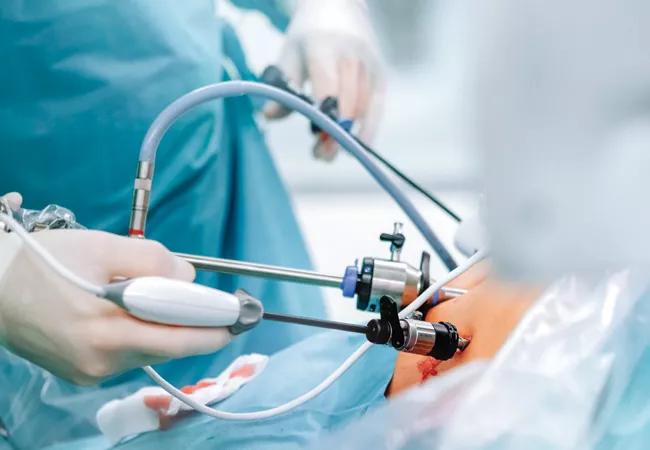Efforts continue to encourage consideration for select candidates

For adolescents with obesity who are refractory to lifestyle modifications and medication management, metabolic and bariatric surgery (MBS) is a well-established strategy for managing the disease and its associated comorbidities. In recent years, this has led to calls for greater physician awareness and patient access to the intervention.
Advertisement
Cleveland Clinic is a non-profit academic medical center. Advertising on our site helps support our mission. We do not endorse non-Cleveland Clinic products or services. Policy
“When paired with comprehensive management, metabolic and bariatric surgery has a track record as a safe and effective intervention for treating obesity and with the most significant impact on related comorbidities when compared with nonsurgical interventions,” says Roy Kim, MD, a pediatric endocrinologist and Medical Director of the Cleveland Clinic Children’s Be Well Kids Center.
However, some pediatric primary care providers may still be hesitant when it comes to referring patients for surgery. Specialists have been working to upend this in recent years.
In 2019, the American Academy of Pediatrics (AAP) published a policy statement describing the incidence of childhood and adolescent obesity, calling severe obesity a “serious and worsening public health crisis” and urging primary care providers to consider MBS as a possible intervention for patients with severe obesity.
This call to action came on the heels of updated management guidelines published in the previous year by the American Society for Metabolic and Bariatric Surgery Pediatric Committee, offering new definitions for the diagnostic criteria of childhood obesity. They define class II obesity as 35 kg/m2 or 120% of the 95th percentile with a comorbidity and class III obesity as BMI > 40 kg/m2 or 140% of the 95th percentile without a comorbidity (whichever is less).
The guidelines also advocated for consideration of surgical intervention earlier than previously recommended in select candidates: those with a BMI > 40 without a comorbidity. Previous guidelines required the presence of a comorbidity for surgical candidacy.
Advertisement
Physicians are hopeful that this momentum will contribute to greater awareness from pediatric providers and empower patients and families to reach out to determine their candidacy for surgery.
Of the Be Well Kids Center, Dr. Kim says there are several on-ramps to evaluation. Many requests for evaluation come from the adolescent’s parents (many of whom have had bariatric surgery themselves) or from their primary care providers. In some cases, surgery is already on their radar, while others haven’t considered it all.
The center also allows continuity of care with the adult bariatric surgery team, led by Ali Aminian, MD, enabling more options for patients and the ability to tailor the intervention to match the patient’s needs.
Take, for example, a recent case of a 17-year-old patient with class III obesity who presented to the Be Well Kids Center with severe sleep apnea and fatty liver disease. Despite adherence to medications and nutritional and exercise programs, he was unable to achieve meaningful improvement. The patient eventually opted for surgical intervention and with it saw a significant decrease in BMI and improvement of weight-related comorbidities.
When considering surgery, the patient and their family meet with a multidisciplinary team consisting of a bariatric surgeon, pediatric and adult psychologists, pediatric medical specialists, and other pediatric subspecialists as dictated by comorbidities. Dedicated bariatric nurses and pediatric dietitians also are involved in the preoperative workup and postoperative care.
Advertisement
Dr. Kim says, “The patient must also have a realistic understanding of the surgery and reasonable expectations about outcomes. They have to be aware of the risks and benefits and be able to articulate those accurately.”
Psychosocial support also factors into surgical candidacy and readiness. “Family support is essential, not only to help facilitate pre and postoperative care but also to help them maintain adherence to their supplements, follow a healthy diet after the weight loss surgery, and provide emotional support.”
The center is also skilled in handling complex medical management, like when a patient presents with a chronic condition, such as an arrhythmia, that makes vigorous exercise dangerous. Or when a known genetic component contributes to obesity that requires unique medical management and collaboration with medical geneticists in Cleveland Clinic’s Genomic Medicine Institute.
Or maybe the patient is simply not a candidate for surgery at the time of evaluation—due to their age, BMI, growth indications, or willingness and ability to adhere to a postoperative regimen. In this case, the center can offer a number of patient-centered lifestyle interventions.
“Whatever modality is most appropriate, Cleveland Clinic Children’s Be Well Kids Clinic is structured to draw on broader expertise across the healthcare system and help patients develop long-term strategies to maintain the outcomes achieved from metabolic and bariatric surgery,” concludes Dr. Kim.
Advertisement
Advertisement

Multidisciplinary framework ensures safe weight loss, prevents sarcopenia and enhances adherence

Study reveals key differences between antibiotics, but treatment decisions should still consider patient factors

Key points highlight the critical role of surveillance, as well as opportunities for further advancement in genetic counseling

Potentially cost-effective addition to standard GERD management in post-transplant patients

Findings could help clinicians make more informed decisions about medication recommendations

Insights from Dr. de Buck on his background, colorectal surgery and the future of IBD care

Retrospective analysis looks at data from more than 5000 patients across 40 years

Surgical intervention linked to increased lifespan and reduced complications